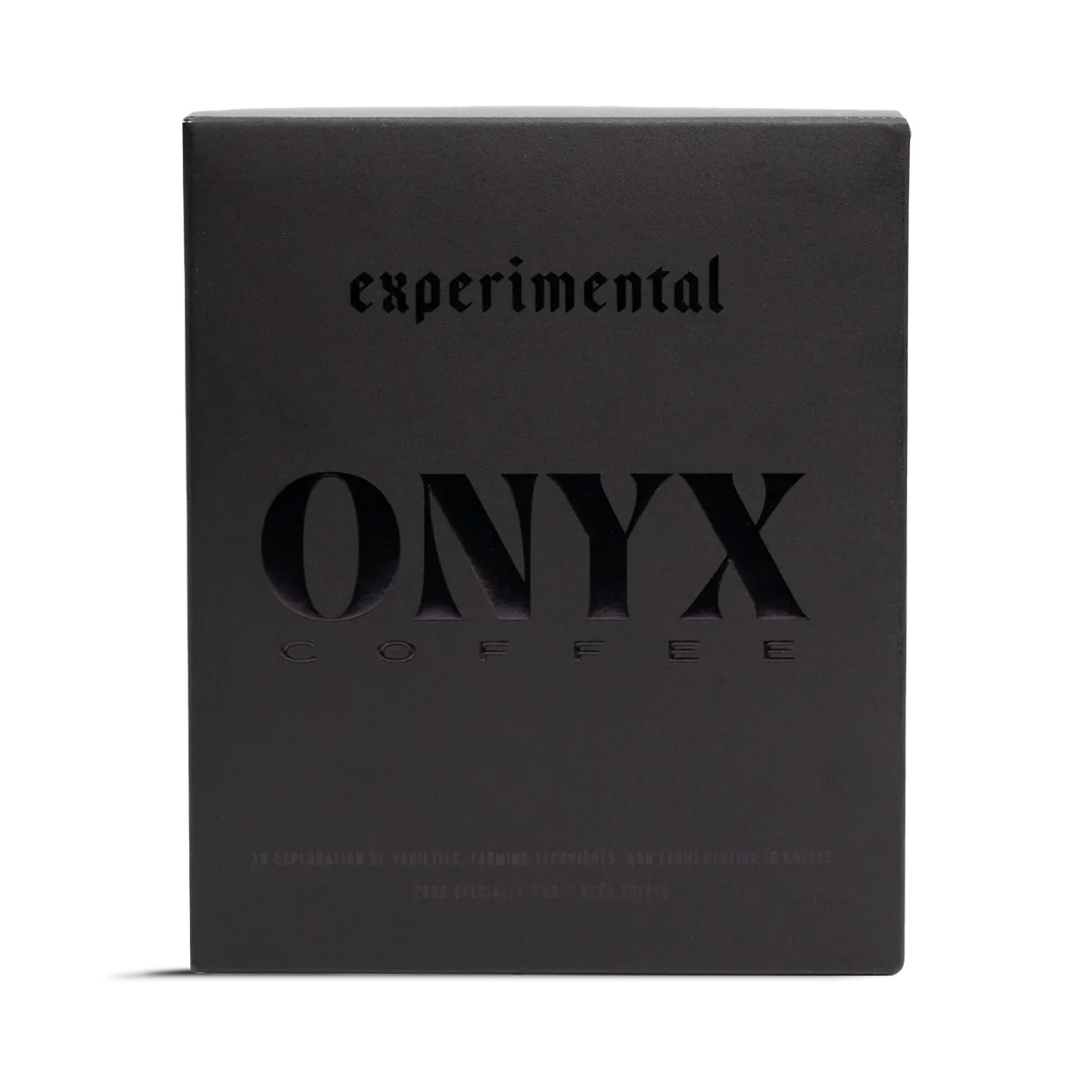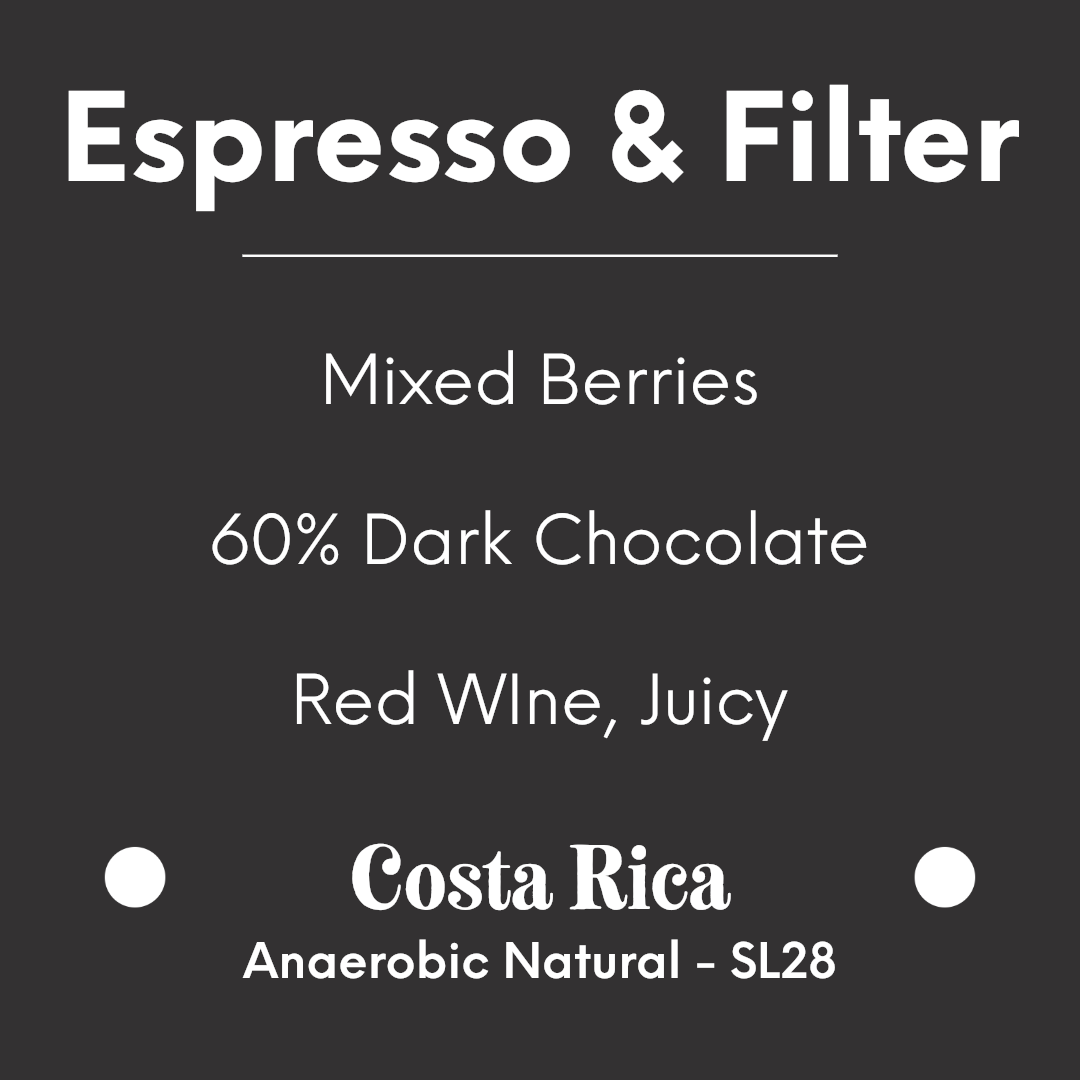ONYX COFFEE LAB
ONYX - Costa Rica Las Lajas SL28 Anaerobic - Costa Rica - Anaerobic Natural - SL28
ONYX - Costa Rica Las Lajas SL28 Anaerobic - Costa Rica - Anaerobic Natural - SL28
Couldn't load pickup availability
Tasting Notes: Mixed Berries, 60% Dark Chocolate, Red WIne, Juicy
Process: Anaerobic Natural & Patio Dried
Origin: Costa Rica
Varieties: SK28
Roast Level: AGTRON #74 Light
Roast Date: December 2, 2024
ONYX Coffee Lab is located in Rogers, United State
From ONYX
This deeply sweet microlot comes to us from our friends at Las Lajas. The SL28 became famous in Kenya and has proliferated since the early 1900s as the premier variety across the country, but it is now cultivated across Central America. We consider this lot to be experimental for its innovative anaerobic processing, bringing forward a deep sweetness and vibrant acidity, reminiscent of berries and dark chocolate.
At Onyx, we have a soft spot for naturally processed coffees. We eagerly await the fresh crop from one specific micro mill that has captured the hearts of Onyx enthusiasts far and wide: Las Lajas in the Central Valley, Costa Rica.
Oscar and Francisca Chacon gained considerable notoriety within the specialty coffee market in the early 2000s when their processing facility suddenly stopped due to an earthquake, inhibiting their ability to adequately remove the fruit from the seeds of their fresh harvest before drying. At this time, washed coffees dominated the market in Costa Rica and Central America generally, and honey processing techniques didn’t exist. This fortuitous malfunction resulted in a harvest that was partially washed and partially ‘pulped natural’, or ‘honey’. To their surprise, they noticed buyers consistently offering higher prices for the honey-processed lots than they were for the more traditional offerings. They saw the opportunity and were inspired to embrace the challenge.
Over the next decade, they began experimenting with precise and consistent dry processing techniques and fermentation methods to bring something new to specialty coffee in Costa Rica. Their success reverberated throughout the industry as roasters flocked to the market, propagating a new era of coffee production potential in Costa Rica.
Traditionally, it is unusual for coffee farmers to roast, taste, and evaluate their coffee before it is priced and exported. It is even more uncommon for producers to reserve even the smallest portion of their crop for personal consumption. Historically speaking, the only meaningful indicator that farmers have ever relied on to measure the success of their harvest has been the cup score they receive from prospective buyers. Seeing this phenomenon occur firsthand while selling their own coffee, the Chacons took a risk and purchased their own roasting machine in 2016. With the newfound ability to taste, experiment, and measure the performance of each of their lots season over season, Oscar and Francisca could finally take long-term success into their own hands - all while paving the way for other local farmers to follow in their footsteps. These days, Las Lajas is broadly considered the premier micro mill in Costa Rica and maintains considerable prestige in coffee production across the western hemisphere.
While Las Lajas may have a history in honey processing, they’ve mastered the skills required to excel in natural processing as well. The incidental revelation of dry processing and the delicious potential of such techniques have forced them to become adept in the sensitive nature of fermentation; whatever shape it takes. This knowledge has equipped them to successfully administer a large spectrum of techniques within their post-harvest processing protocols, creating an impressive portfolio of coffees for international roasters to choose from.
‘Perla Negra’, or ‘Black Pearl’, is the name Oscar and Francisca have chosen to refer to their premium and 100% organic natural processed coffee. We at Onyx know it as the “Las Lajas Natural”, but its flavor profile is far from simple. Boasting an immediately recognizable taste of fresh berries, a smooth vanilla sweetness, and a finish like rich chocolate truffles, it's no wonder why this coffee has found the hearts of Onyx enthusiasts here in Arkansas and around the world. Its bold characteristics and silky tactile also make it highly versatile across many different methods of brewing.
SL28
Sometimes, small decisions are made that will affect an entire industry with one crucial turn of fate. One such occurrence was when A.D. Trench toured Tanzania in 1931, where he noted one particular variety that was both resistant to pests and drought. Seedstock from this tree was studied, and its hardiness was verified as it proliferated across coffee-growing regions in East Africa. This variety was secure within its distribution until it was superseded by its own progeny, a variety that we now know as SL28. Scott Labs variety #28 was (and is) the prize selection of the hard work of entomologists, mycologists, and plant breeders. Concentrated growth of SL28 began around 1935 and continues to this day within vast swaths of Kenya and the bordering countries. This variety is known for its thick trunk (aiding in drought tolerance) and its sparkling cup quality when processed and grown well. This variety's fame (and its seeds) have spread not only to the surrounding countries, but to both central and south America and beyond. Now commercially cultivated in countries such as Costa Rica and Bolivia and far-flung origins like Taiwan, one begins to question whether we cultivate varieties or varieties utilize us to proliferate into a successful form of a species.
Share




